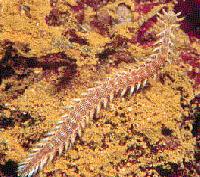

To sum up: the research to date suggests that even worms with very simple central nervous systems and brains can learn to associate a neutral stimulus with a biologically significant non-neutral stimulus. These animals are "educable". This certainly represents an evolutionary "great leap forward". Even simple worms possess an internal mechanism that allows them to acquire new patterns of behaviour, making them truly flexible. It would be tempting to conclude that associative learning corresponds to the appearance of mental states in animals.
But as we saw, some kinds of associative learning are more sophisticated than others, and even flexible behaviour patterns can be generated by inflexible internal mechanisms, responding to a changing environment. I concluded that internally generated flexibility of behaviour patterns is not sufficient to establish the presence of cognition (Conclusion S.12). A cognitive animal must also possess an internal mechanism that not only enables it to acquire new behaviour patterns, but also to adjust and control these behaviour patterns. Operant conditioning - defined strictly as a process whereby the organism uses its internal representations (acquired from experience and stored in its memory) to select from a range of alternatives and achieve a goal by means of internally controlled, fine-tuned bodily movements - was tentatively proposed as the simplest form of cognitive behaviour. However, there is no convincing evidence to date that worms are capable of undergoing operant (as opposed to instrumental) conditioning. Likewise, there is no evidence that they are capable of "learning to learn". There are thus insufficient grounds at present for ascribing mental states to worms.
It should also be said that the current state of research into invertebrate learning is very incomplete. The learning mechanism has not been fully investigated, and crucial experiments have not been performed. We still do not know how similar learning in "simple" invertebrates is to that in vertebrates. In particular, the question of whether they have a mechanism for controlling acquired patterns of behaviour has yet to be resolved.
References
*** SUMMARY of Conclusions reached